Ketanji Brown Jackson, President Biden’s nominee to replace retiring Supreme Court Justice Stephen G. Breyer, began two days of questioning before the Senate Judiciary Committee on Tuesday. Questioning continues Wednesday.
After the hearings conclude, the committee will vote on sending her nomination to the full Senate. Democrats hope to confirm Jackson by April 8, when they leave Washington for a two-week spring recess.
- Share via
Watch live: Ketanji Brown Jackson confirmation hearing, day 2

- Share via
Critical race theory made appearance at hearing — via Georgetown Day School

Sen. Ted Cruz (R-Texas) held up and quoted from several books for young children that talked about race and its importance, while trying to link Judge Jackson to critical race theory, a progressive social justice theory that has galvanized conservatives.
Cruz said the mission of Georgetown Day School — where Jackson and her husband Patrick are on the board — and the books it uses are “filled with critical race theory.” That theory sees “every conflict as a racial conflict,” he said.
She said she understood critical race theory as something taught or discussed in universities and law schools, not elementary schools. The theory involves how racial inequality can be built into legal systems.
“I have not reviewed those books,” she said of the books used at Georgetown Day.
Moreover, she said critical race theory “doesn’t come up in my work as a judge.”
Jackson explained the school began in 1945, at a time when public schools in the District of Columbia were segregated by race.
She said three white families and three Black families created a new private school where the “idea of equality and justice would be at the core of its mission.”
- Share via
Rep. Lee blasts GOP’s ‘smearing’ tweets of Jackson
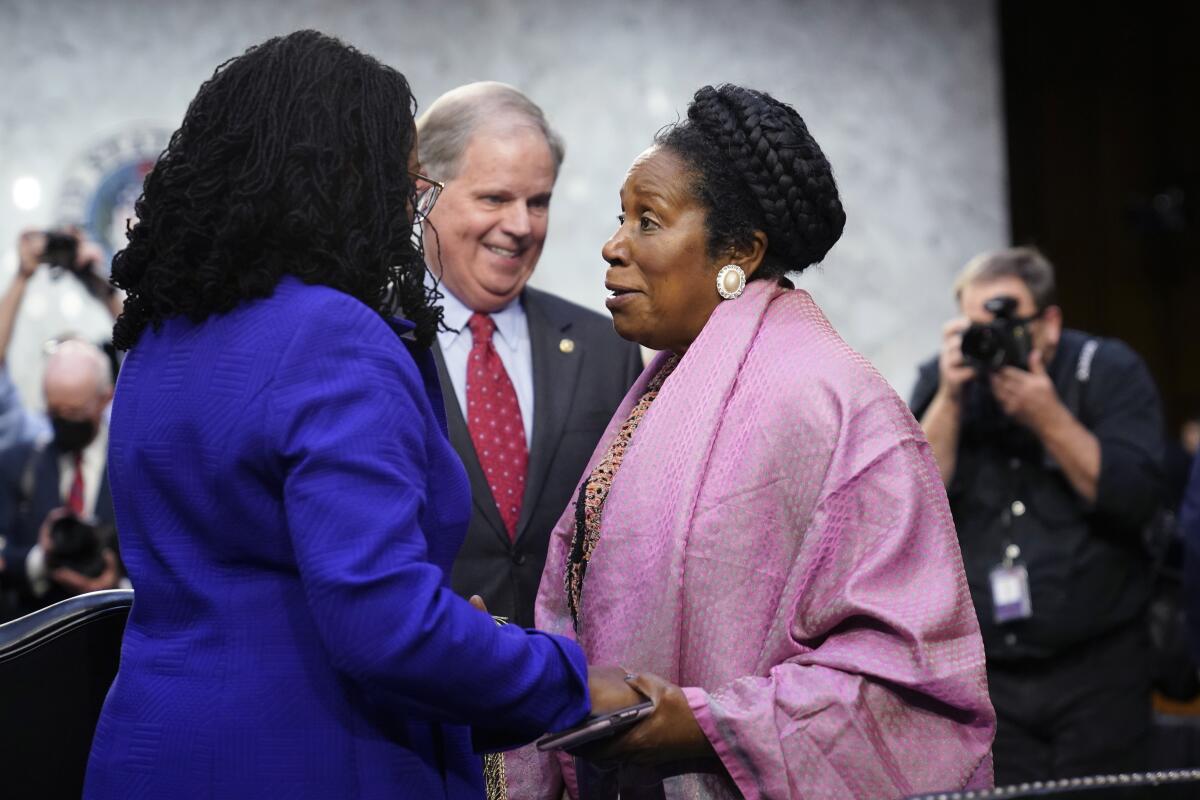
Rep. Sheila Jackson Lee (D-Texas), who is attending Judge Ketanji Brown Jackson’s confirmation hearings, called the Republican National Committee “shameful” after it posted a GIF that crossed off Jackson’s initials and replaced them with “CRT,” a reference to critical race theory.
In an interview during a break, Jackson Lee said she was “in complete shock” after seeing the post.
“As a Black woman, I was saddened, and I felt compelled to call it shameful smear tactics,” she said. “When you have no substance, when you have no facts, when you don’t understand the historic moment and when you have no truth, you resort to smearing.”
Jackson Lee told The Times she hopes people respond to the post.
“I think it is the height of disrespect,” she said. “This has been an evenhanded, keenly astute, intellectually genius member of the court of appeals who is responding informatively to questions by those who are supposed to be dealing with the confirmation process.”
She said the post sought to blot out Jackson as “insignificant” by crossing out her identity and replacing it with a “completely irrelevant, misguided, interpreted, wrongheaded” reference.
“Disrespectful is minimally what it is,” she said.
She also thanked Sen. Chris Coons (D-Del.) for defending Jackson against Sen. Ted Cruz’s (R-Texas) earlier line of questioning on critical race theory and the 1619 Project, which Jackson stressed were unrelated to her work.
“The one thing we know today is that a Black woman is sitting in that seat for the first time since 1789,” Jackson Lee said.
- Share via
Cruz tries to paint Jackson as soft on sexual predators. She calls him misleading
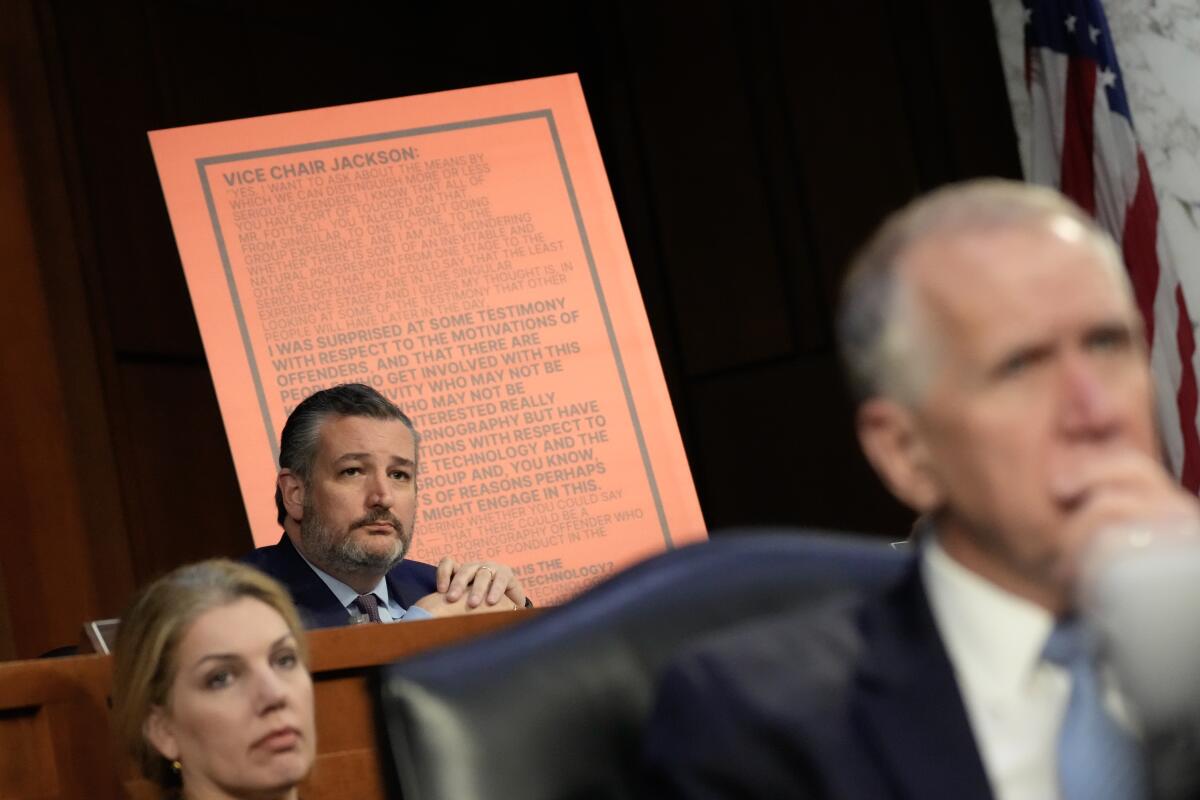
Sen. Ted Cruz (R-Texas) accused Judge Jackson of having a “record of activism concerning sexual predators,” from her time at the Harvard Law School to her time as a trial judge.
As evidence, he cited something she wrote as a law student in 1996 about the new wave of laws that called for locking up sex criminals after they had completed their prison terms.
Jackson said Cruz’s account was misleading.
She said she was writing about whether these laws were “punitive or preventative.” Usually, the government cannot impose new and extra punishment after a prisoner serves his term, but it may impose extra sanctions to prevent someone from committing further crimes.
The Supreme Court split 5-4 on that issue in 1997 in the case of Kansas vs. Hendricks in which the majority upheld civil detention as preventive, not punitive.
Cruz then cited 10 cases in which Jackson gave a child pornography defendant a somewhat lower prison term than recommended by prosecutors.
Jackson said her sentences were entirely in accordance with the requirements set by Congress for considering such cases. She refuted any suggestion that she was sympathetic to criminals. ”I did my duty to hold these defendants accountable,” Jackson said. “These are cases that wake me up at night” because the crimes are horrible.
Sen. Chris Coons (D-Del.) followed Cruz and pointed out that Cruz did not mention several cases where Jackson sentenced a pornography defendant to the prison term recommended by prosecutors. He also noted that many judges have said that the prison terms in these cases were too high for defendants who possessed pornography but did not themselves molest or abuse children.
- Share via
Biden proud of Jackson’s ‘grace and dignity’

President Biden is “proud” of Judge Ketanji Brown Jackson’s performance in the first day and a half of her confirmation hearings, the White House said Tuesday.
“The president watched portions of Judge Jackson’s hearing yesterday and today and is proud of the way she is showcasing her extraordinary qualifications, her experience and her evenhandedness,” White House Deputy Press Secretary Chris Meagher told reporters at a briefing.
Meagher said Biden “was also moved by the grace and dignity she has shown, the deference to senators and the level of detail she is offering, reinforcing the value of her experience, her intellect and the strength of her character.”
Several White House officials appear to have followed the hearings closely, with staff often promoting positive tweets about Jackson or posts that quote her testimony and using social media to push back on Republicans’ criticism.
Meagher said the president “was also struck by how she swiftly dismantled conspiracy theories put forward in bad faith,” noting that “they’ve been debunked by numerous fact checks, experts and the record itself.”
- Share via
GOP senator accuses Jackson of calling Bush a ‘war criminal.’ Not quite, Democrats say
In the final two minutes of Sen. John Cornyn’s (R-Texas) time for questioning, he raised eyebrows by suggesting Judge Ketanji Brown Jackson had called former President George W. Bush and former Defense Secretary Donald Rumsfeld a “war criminal.”
“Let me just close on one other question,” Cornyn began. “I don’t know you well, but I’ve been impressed by our interaction, and you’ve been gracious and charming. Why in the world would you call Secretary of Defense Rumsfeld and George W. Bush war criminals in a legal filing? It seems so out of character for you.”
Cornyn said he was referring to a time when Jackson, as a federal public defender, was representing a member of the Taliban, whom the Pentagon identified as an intelligence officer.
Jackson said she didn’t remember the reference but insisted, “I did not intend to disparage the president or the secretary of defense.” According to CNN fact-checker Daniel Dale, Cornyn was referring to a legal filing related to allegations that a Guantanamo Bay detainee had been tortured.
The 2005 document said the “Respondents’ acts directing, ordering, confirming, ratifying, and/or conspiring to bring about the torture and other inhumane treatment of Petitioner Khiali-Gul constitute war crimes and/or crimes against humanity in violation of the law of nations…”
The list of respondents included Bush and Rumsfeld, among others. “Being a war criminal has huge ramifications,” Cornyn said. “You may be subject to the jurisdiction of the International Criminal Court and called before that international tribunal and tried for war crimes, so it’s not a casual comment, I would suggest.”
After a lunch break, Sen. Richard J. Durbin (D-Ill.) cleared up the controversy on Jackson’s behalf. He said she filed several habeas petitions as a public defender against the U.S., which named Bush and Rumsfeld in their official capacities.
“You were advocating on behalf of individuals who argued they were civilians wrongly classified as enemy combatants of the United States, and your filing was part of your professional responsibility to zealously advocate for your clients,” Durbin said, adding that the petitions included more than a dozen claims for relief, including one claim of torture, which is a war crime.
“Apparently, this is what Sen. Cornyn was referencing,” he said to Jackson. “So to be clear, there’s no time where you called President Bush or Secretary Rumsfeld a ‘war criminal.’ ”
- Share via
Fact check: GOP mischaracterizes Jackson on critical race theory, crime views
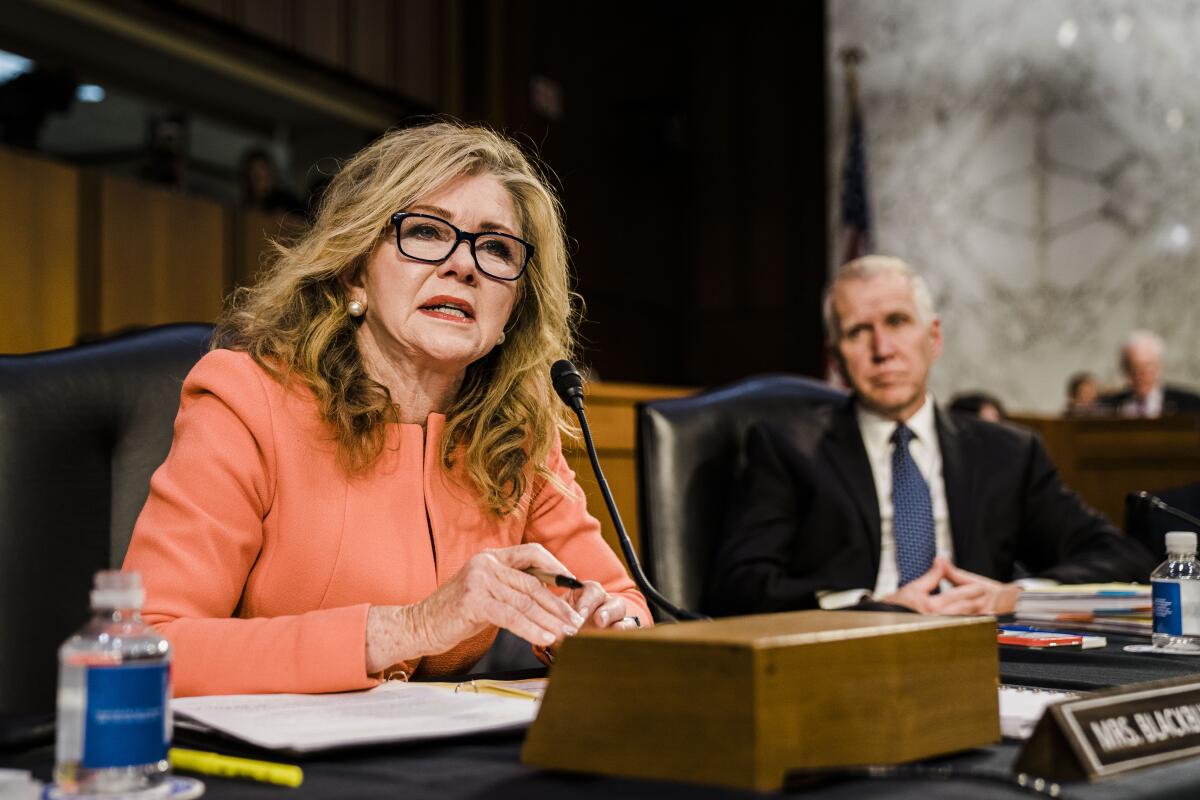
Republican Sen. Marsha Blackburn mischaracterized Supreme Court nominee Ketanji Brown Jackson’s judicial views as extremist and soft on crime, claiming she called for critical race theory to be a mandatory consideration in federal sentencing and sought to release all criminals during the pandemic.
Jackson didn’t on either front.
Blackburn joined Sen. Josh Hawley and other Republicans during the confirmation hearings in airing a line of conservative grievances that relied on a distortion of the judge’s record.
- Share via
Feinstein stresses gender equality, abortion access

Sen. Dianne Feinstein (D-Calif.) highlighted issues important to women in much of her questioning of Judge Ketanji Brown Jackson, focusing on abortion policy, safety and gender parity.
Jackson told Feinstein she agreed with previous Supreme Court nominees Neil M. Gorsuch and Amy Coney Barrett that Roe vs. Wade, which determined the constitutionality of a woman’s right to have an abortion, is settled law. That phrasing is often used by nominees, though it reveals little about how they might rule on the issue. It merely acknowledges the current precedent.
Feinstein read into the record a letter of support from the International Assn. of Chiefs of Police and asked Jackson to talk about how her family members’ careers in law enforcement have impacted her approach to the law.
The senator also acknowledged that Jackson, if confirmed, would become only the sixth woman to serve on the high court and make the Supreme Court “the nearest we’ve ever come to gender equity” with four women and five men — and asked Jackson how meaningful that is to the nation.
“We want, I think, as a country, for everyone to believe that they can do things like sit on the Supreme Court,” Jackson said, “and so having meaningful numbers of women and people of color, I think, matters.”
Feinstein, a barrier-breaking woman herself, also thanked Jackson, the first Black female Supreme Court nominee, and credited her for her handling of the first few set of questions from members of the committee.
“I think you’re doing very well,” Feinstein told her. “As you can see, this is a bit of a tough place.”
- Share via
Graham presses Jackson on her faith — to illustrate why that’s unfair

Sen. Lindsey Graham (R-S.C.) aired his grievances over Democrats’ handling of past conservative Supreme Court nominees Tuesday, asking Judge Ketanji Brown Jackson a series of pointed questions about faith that Democrats had asked previous Republican nominees.
Graham’s questions included a memorable line Sen. Dianne Feinstein (D-Calif.) said to Justice Amy Coney Barrett in 2017, when the California Democrat told Barrett that “the dogma lives loudly within you.”
Graham asked Jackson about her faith, how committed she is to it and how often she attends church. Jackson stressed the importance of separating her faith from how she’d rule as a justice.
“How would you feel if a senator up here said … ‘the dogma lives loudly within you, and that’s a concern,’” Graham asked. “How would you feel if somebody up here on our side said [that] you attend church too much for me, or your faith is a little bit different to me, and they would suggest that it would affect your decision? Would you find that offensive?”
“Senator, I—,” Jackson began, before Graham interrupted.
“I would, if I were you,” Graham said. “I found it offensive when they said it about Judge Barrett. The reason I ask these questions is I have no doubt that your faith is important to you, and I have zero doubt that you can adjudicate people’s cases fairly.”
“You’re reluctant to talk about it because it’s uncomfortable,” he added. “Just imagine what would happen if people on late-night television called you an effing nut, speaking in tongues because you practiced your Catholic faith in a way they couldn’t relate to or found uncomfortable.”
- Share via
Jackson declines to say whether she supports increasing size of Supreme Court
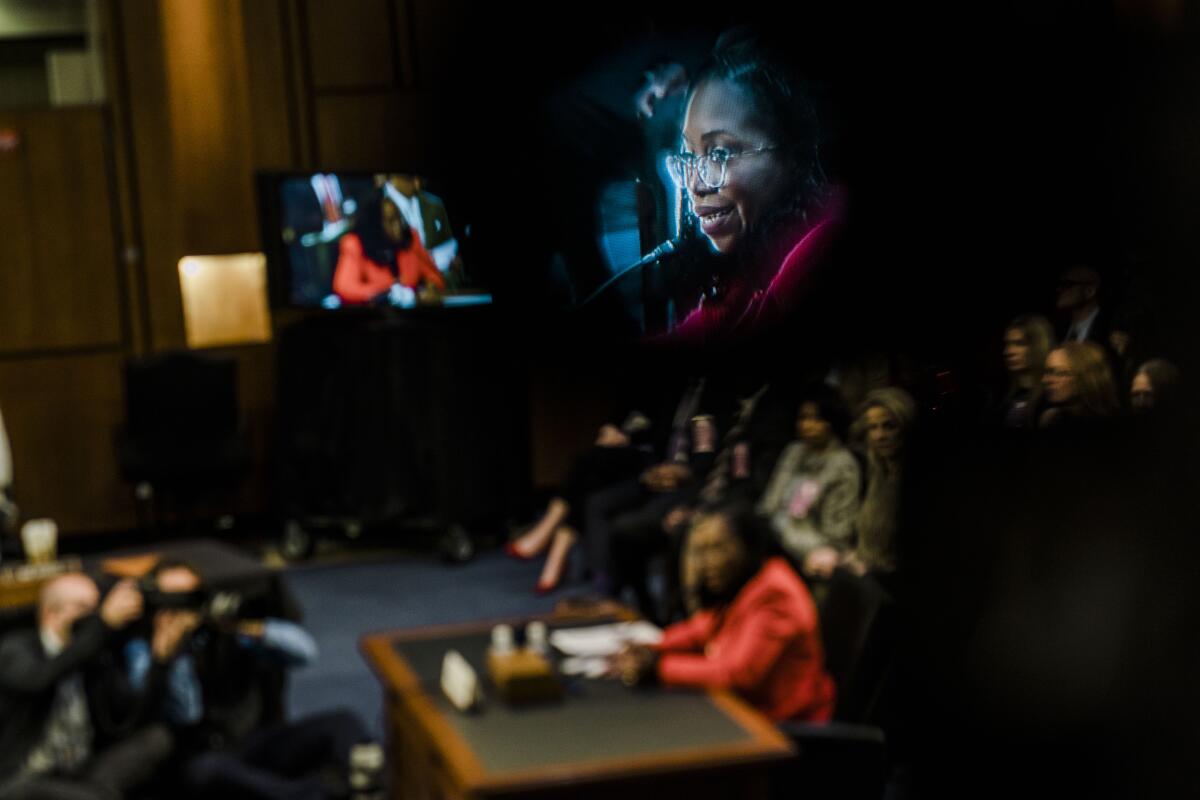
Judge Ketanji Brown Jackson repeatedly declined to give a response on the issue of court-packing, telling the Senate Judiciary Committee that it is a policy matter that should be left to Congress.
Sen. Charles E. Grassley, the top Republican on the panel, posed the question to Jackson at Tuesday’s hearing. Grassley framed his question by noting that retiring Justice Stephen G. Breyer and the late Justice Ruth Bader Ginsburg both said court-packing is a bad idea.
“Respectfully, senator, other nominees to the Supreme Court have responded as I will, which is that it is a policy question for Congress,” Jackson said. “And I am particularly mindful of not speaking to policy issues because I am so committed to stay in my lane of the system.”
There’s little benefit to Jackson answering the question. If she agreed with Breyer and Ginsburg that the Supreme Court should have no more or less than nine justices, Republicans would amplify that message, likely leading to exposed divisions among Democrats.
The court currently has a 6-3 conservative lean, which won’t change when Jackson succeeds Breyer, a liberal appointee.
But if Jackson expressed support for Supreme Court expansion, it would play into Republicans’ hands, giving them fodder to claim she’s a radical nominee and pressuring moderate GOP senators to oppose her historic nomination to the Supreme Court.
Democrats can confirm Jackson to the high court with only Democratic votes, but the White House and Democratic leaders are hoping to see Jackson confirmed on a bipartisan basis, as she has been three previous times.
- Share via
Jackson swats back GOP claims she’s been soft on child pornographers
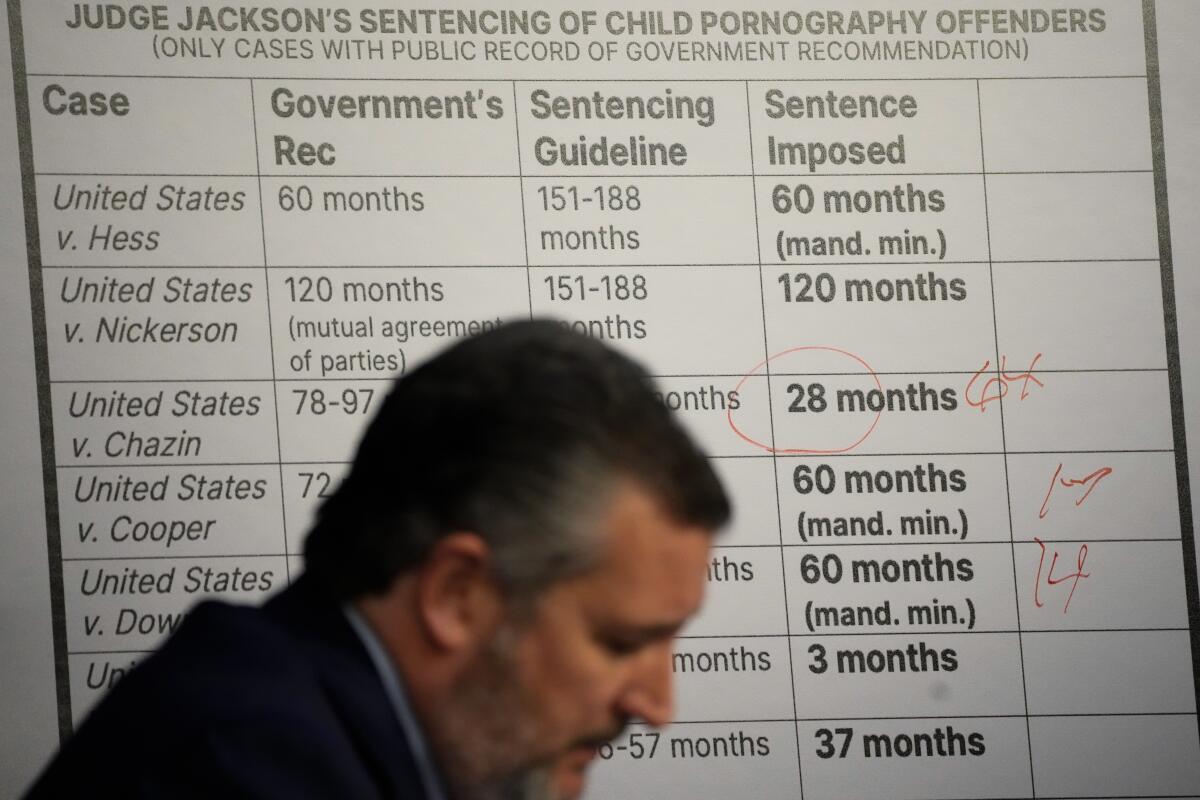
Senate Judiciary Committee Chairman Richard J. Durbin (D-Ill.) opened Tuesday’s questioning of Judge Ketanji Brown Jackson by having her address a series of issues that Republicans on the panel raised in their opening statements Monday, including her sentencing record on child pornographers.
Jackson described child pornography as a “sickening and egregious crime” that she had to deal with regularly as a sentencing judge.
She was responding to claims from Sen. Josh Hawley (R-Mo.) that she was lenient to such criminals.
“Nothing could be further from the truth,” she said. She added that she made sure “the children’s voices” are heard in these sentencing hearings, and she described how their lives can be ruined because of pornography that circulates on the Internet. She said she sentenced these criminals to prison and also imposed rules that prohibits them from using a computer for decades.
The questions Durbin posed allowed Jackson to answer freely about her judicial philosophy, calls for a Supreme Court expansion, her handling of child pornography cases and her representation of Guantanamo Bay detainees.
She vigorously defended her record on child porn cases, detailing how she has handled such cases in the past and insisting that she not only imposed significant sentences, but also added significant restraints.
Jackson also reiterated that she would rule from a position of neutrality and declined to share a personal view of the progressive policy proposal to expand the high court to more than nine justices.
- Share via
Expect to hear the name of this liberal group a lot at Jackson’s hearing today
Senate Republicans repeatedly name-checked “Demand Justice” on Monday, signaling that part of Tuesday’s and Wednesday’s strategy will be to press Judge Ketanji Brown Jackson into explaining why a progressive judicial advocacy group that supports Supreme Court expansion also backs her nomination.
The insinuation from Republicans is that Jackson must share the group’s liberal views, including on the concept of court-packing, which she declined to speak on in a private meeting with Senate Minority Leader Mitch McConnell (R-Ky.). Republicans are also trying to pin down Jackson on whether she would be a judicial activist on the high court.
Demand Justice, an organization founded during the Trump administration, has poured $1 million into pro-Jackson advertising and pumped six figures into promoting her during her D.C. Circuit Court nomination last year. It hopes to one day rival more powerful, established conservative advocacy groups like the Federalist Society.
Brian Fallon, Demand Justice’s executive director, told The Times in a recent interview that support for Jackson is part of the group’s larger push for professional diversity on the bench, rather than elevating the same types of corporate lawyers that Republicans and Democrats alike have done in the past.
And the organization took the high-profile mentions during the opening day of Jackson’s Supreme Court confirmation hearings in stride.“Every time you hear Republicans talk about us,” Demand Justice tweeted, “it’s just another reminder: they know they can’t win a debate about Judge Jackson’s extraordinary qualifications.”
- Share via
What will Jackson say today? As little as possible
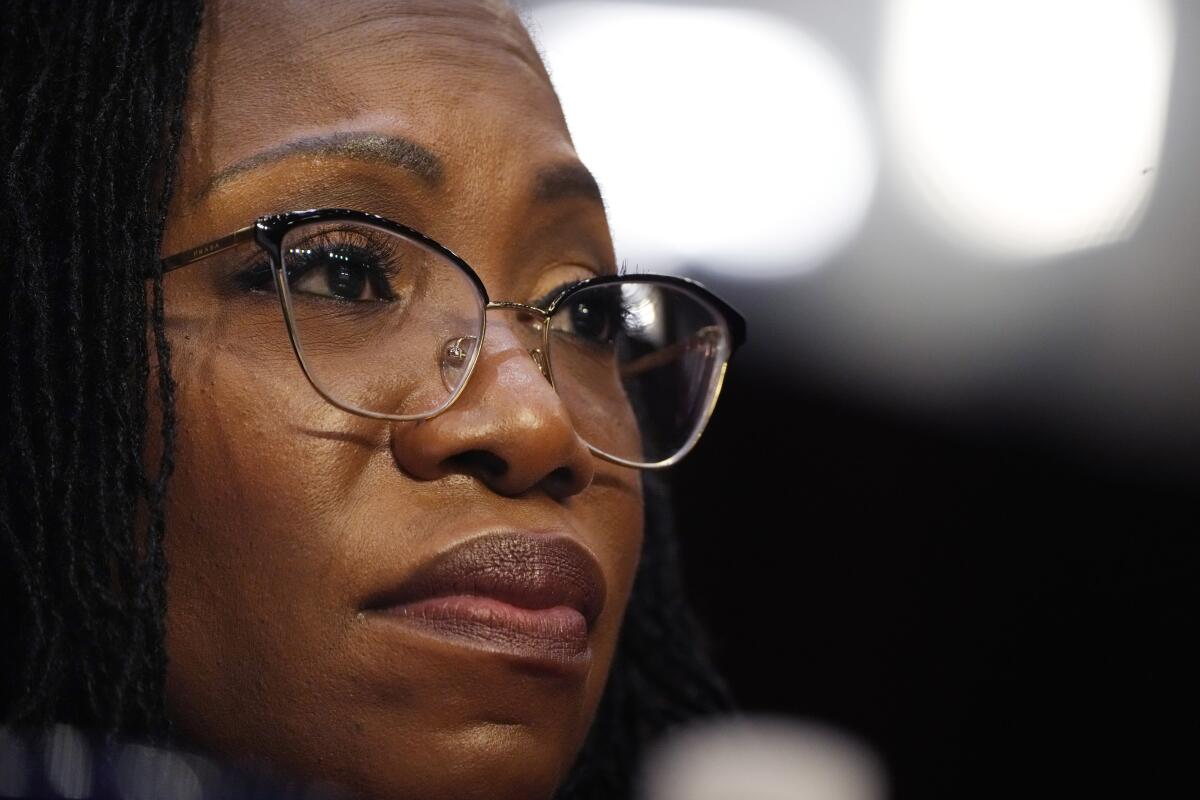
The guiding rule for Supreme Court nominees has been there is no penalty for saying too little and danger in saying too much.
Judge Robert Bork was famously defeated in 1987 after he tried to explain and defend his conservative views on abortion, civil rights and free speech. Ever since, nominees have refused to reveal their views on controversial issues.
In 1991, Justice Clarence Thomas told skeptical senators he had never discussed or debated Roe vs. Wade and had no preconceived view on abortion. That did not prevent him from voting to overturn Roe vs. Wade during his first term on the court.
Justice Sonia Sotomayor told senators in 2009 she respected the right to bear arms in the 2nd Amendment and the individual right adopted by the court a year earlier. But when the issue returned in 2010, she voted to reject the individual right to a gun.
Look for Judge Ketanji Brown Jackson to follow this general approach. She can discuss legal controversies and explain what the court has said in the past, but without revealing whether she agrees or disagrees with those precedents. If, for example, a question touches on abortion or affirmative action, she can refuse to discuss the issue on the grounds it could come before her as a justice.
- Share via
So what are Jackson’s chances of confirmation?
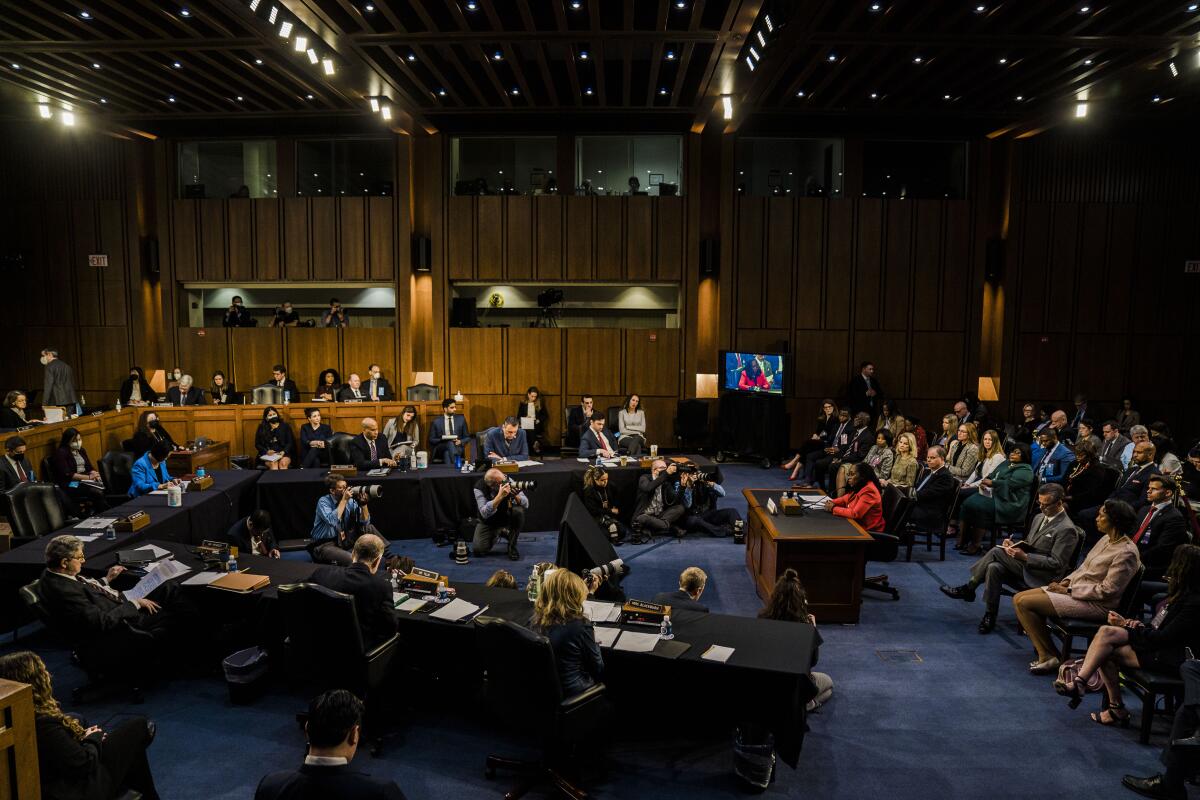
They are pretty good, considering the situation. Because Vice President Kamala Harris can break a tie, Democrats are confident they can confirm Jackson as long as all the Democrats and the two independent senators who caucus with them vote in her favor.
It’s also possible that a couple of Republican senators might vote for Jackson, such as Sens. Susan Collins of Maine and Lisa Murkowski of Alaska, who both voted to confirm Jackson last year to the U.S. Court of Appeals for the District of Columbia Circuit. Neither of those senators have announced yet how they plan to vote.
- Share via
Day 1 recap: Jackson vows to protect Constitution, be neutral
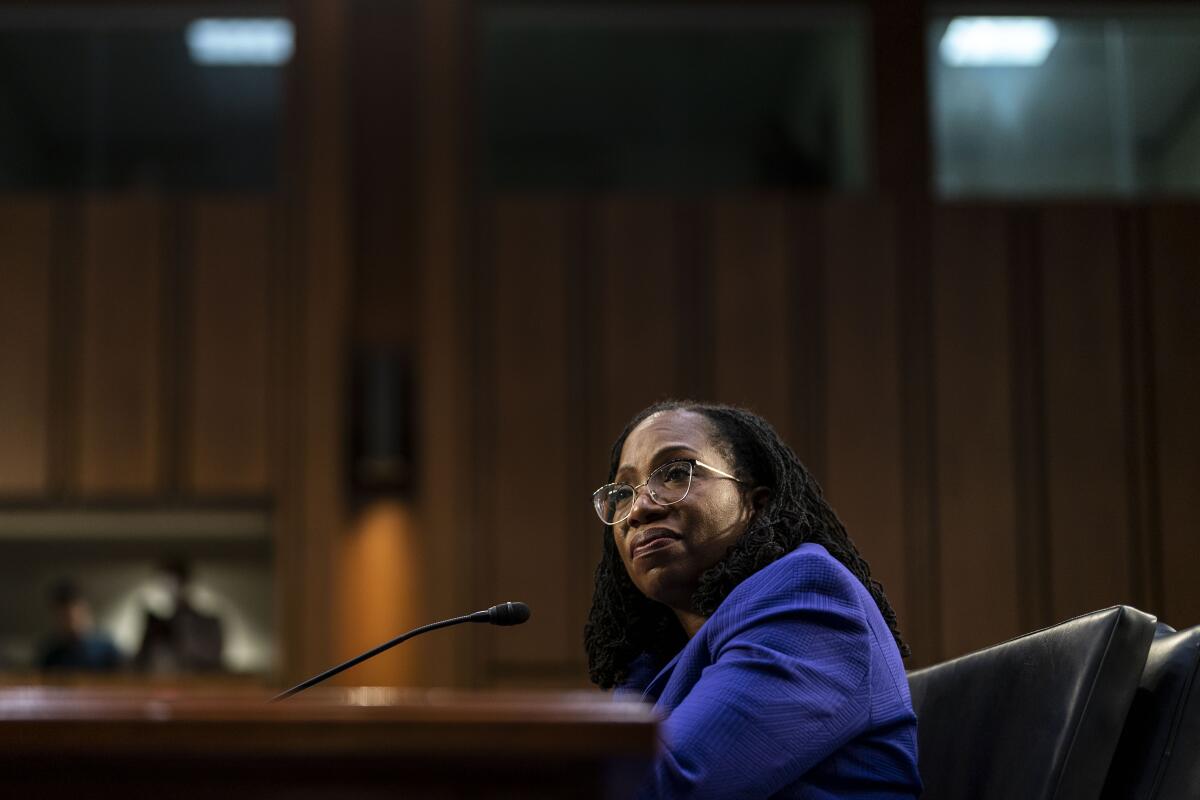
Judge Ketanji Brown Jackson, President Biden’s historic nominee to the Supreme Court, promised Monday that if confirmed to the Supreme Court, she would “defend the Constitution and the grand experiment of American democracy that has endured over these past 246 years.”
Democrats praised Jackson as a strong, experienced choice.
“Today’s a proud day for America,” Sen. Richard J. Durbin, chair of the Judiciary Committee, said in his opening statement. “Judge Jackson, I have no doubt that history will remember you as a justice who never stopped working to defend the Constitution.”
“This is a day of joy,” said New Jersey Sen. Cory Booker. “This has never happened before. This is a hopeful day. It shows the world the promise of a true democracy.”
“The men who wrote our founding documents never imagined you could be here,” said Sen. Alex Padilla (D-Calif.), describing himself as the “proud son of immigrants from Mexico. Your appearance here begins a new chapter in American history.”
Opening statements from Republicans skewed less toward Jackson’s record and view, and more toward criticizing their Democratic colleagues for their past handling and treatment of conservative nominees, such as Justices Brett M. Kavanaugh and Amy Coney Barrett.
